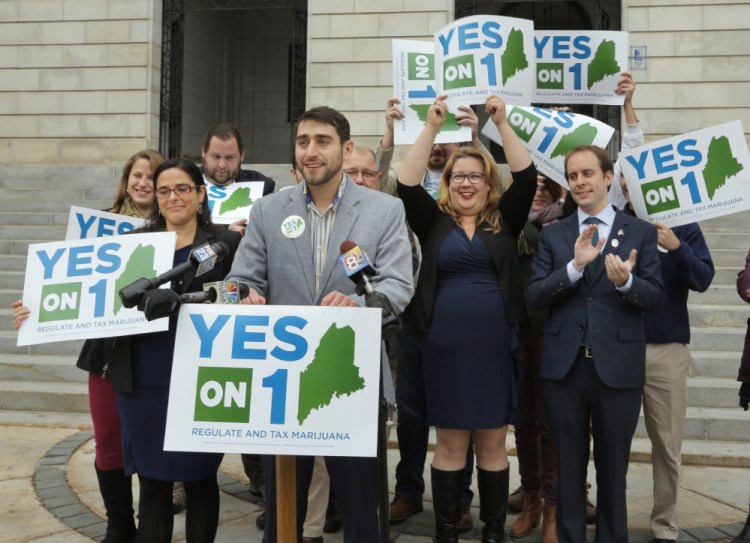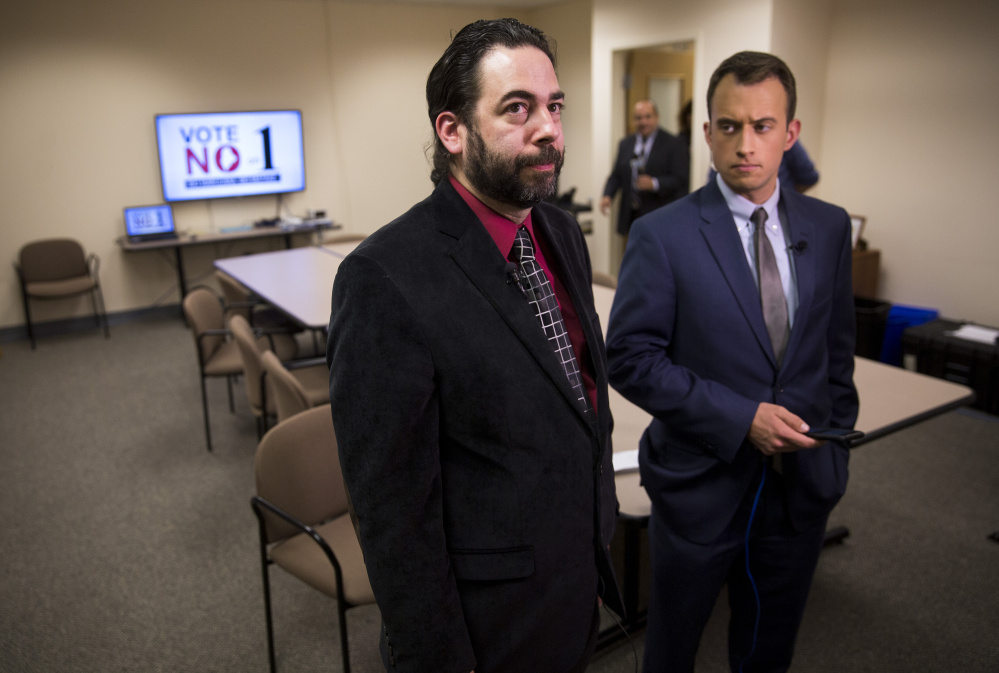Supporters of a referendum effort to legalize marijuana in Maine claimed victory Wednesday, while opponents refused to concede and suggested there could be a recount.
With 98 percent of precincts reporting, 50.2 percent of voters supported legal marijuana for adults 21 and older. The “yes” campaign led by 3,187 out of 749,059 votes.
If the final vote confirms Mainers’ approval of Question 1, the state will become one of two states on the East Coast to legalize recreational marijuana for adults. Massachusetts, California and Nevada on Tuesday voted in favor of legalization, while Arizona rejected it.
The potential of four states joining Colorado, Washington, Alaska and Oregon in legalizing cannabis led advocates to claim momentum Wednesday for nationwide legalization. A quarter of the country’s population is now living in states that have legalized use of the drug.
“We were on the right side of history,” Rep. Diane Russell, a Portland Democrat who first introduced a legalization bill five years ago, said during a news conference Wednesday morning outside Portland City Hall.
But opponents of Question 1 in Maine did not concede, citing thousands of ballots that had not been counted and a razor-thin margin.
“Pending the final tally of the vote, our campaign leaves all options on the table for next steps, including a potential recount request,” said Scott Gagnon, campaign director for Mainers Protecting Our Youth and Communities.
Along with eight Maine communities that had still not reported voting results to the Associated Press as of late Wednesday, the town of Scarborough was recounting absentee votes Wednesday afternoon after discovering that an estimated 2,700 absentee ballots were not included in the election totals reported Tuesday night.
If the early election results hold up, adults would be allowed to possess up to 2½ ounces of marijuana and cultivate their own plants 40 days after the election – or the week before Christmas. The Maine Department of Agriculture, Conservation and Forestry and legislators would spend the next nine months to a year developing rules and regulations for the program, with a goal of having retail stores open by Jan. 1, 2018, according to lawmakers who backed the initiative.
Besides a possible recount, however, the initiative could also face a challenge from Gov. Paul LePage, campaign supporters said Wednesday. In October, LePage said he would mount a court challenge if voters approved recreational marijuana for adults. He said he could be impeached if he allows the law to take effect because he takes an oath to uphold federal laws, under which marijuana remains illegal.
It also remains unclear what impact the administration of President-elect Donald Trump could have on the nationwide movement toward legalization.
Trump told the Washington Post in late 2015 that states should be allowed to legalize marijuana if they choose to do so and said he fully supported medical marijuana, and many advocates don’t foresee a change from the Obama administration’s hands-off approach.
“We have no reason to believe Trump would escalate the war on drugs,” Ron Kampia, executive director of the national Marijuana Policy Project, said in a conference call with reporters Wednesday. “As far as we are concerned, the federal stance is status quo.”
But Ethan Nadelmann, executive director for the Drug Policy Alliance, said he remains deeply concerned about how Trump will deal with the changes.
“His most likely appointees to senior law enforcement positions – Rudy Giuliani and Chris Christie – are no friends to marijuana reform, nor is his vice president,” Nadelmann said in a prepared statement. “The momentum for ending marijuana prohibition took a great leap forward with the victories in California and elsewhere, but the federal government retains the power to hobble much of what we’ve accomplished.”
At the news conference in Portland Wednesday morning, supporters of the Yes on 1 campaign celebrated what they called a historic moment for Maine that puts the state at the forefront of the push to reform marijuana policy across the country.
“We’re confident Maine can be a model for New England on how to properly and responsibly regulate marijuana,” said David Boyer, campaign director for the Yes on 1 campaign.
If the Yes on 1 victory is confirmed, the legalization initiative would not go into effect immediately. The governor has 10 days to proclaim the election results and, after that is done, the law takes effect in 30 days.
Sen. Mark Dion of Portland and Sen. Eric Brakey of Auburn said Wednesday that legislators will need to work together to put in place robust rules and regulations that prevent children from access to recreational marijuana. Brakey said a priority will be addressing things like packaging and edible marijuana products to make sure they don’t appeal to children.
Dion said it will also be important for the state to communicate with municipalities, which will be able to put in place zoning for marijuana businesses or ban them outright.
“The easy part – and it was hard – was yesterday,” Dion, a Democrat, said Wednesday. “It could take years to get every piece worked out.”
Brakey, a Republican, also responded Wednesday to concerns from medical marijuana caregivers and patients about the future of the state’s longstanding medical program. Brakey said the recreational initiative does not change the medical program and he is confident the Legislature’s Health and Human Services Committee will continue to show strong support for keeping the medical program in place.
Send questions/comments to the editors.






Comments are no longer available on this story